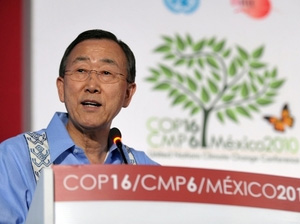
|  |  |  Editorials | Issues Editorials | Issues  
Foreign Policy: How Mexico Mastered Multilateralism
 David Bosco - NPR.org David Bosco - NPR.org
go to original
December 15, 2010


| | United Nations Secretary General, Ban Ki-moon speaks during the United Nations Framework Convention on Climate Change held in Cancun, Mexico. The convention has been viewed by many as a modest success. (Cris Bouroncle/AFP/Getty Images) |  |
A number of observers are attributing the modest success of the Cancun climate change negotiations to the deftness of the Mexican leadership of the conference. Michael Levi of the Council on Foreign Relations concluded:

"By all accounts, the Mexican diplomatic team displayed great skill, giving all parties a voice while taking the reality of international power politics seriously. As a result, they eliminated silly procedural excuses for rejecting an agreed outcome, and in doing so appear to have established a much firmer foundation that the Copenhagen accord ever came close to enjoying."

Levi is hardly alone in trumpeting Mexican prowess. I'm told that in their formal statements last week, diplomat after diplomat compared Mexico's skillful handling of the negotiations with Denmark's clumsy stewardship during the Copenhagen negotiations. The Mexican team received several standing ovations at the end of the process. Observers point to several things that Mexican diplomats did well.

First, they worked hard to prepare for the possible holdouts, such as Venezuela, Bolivia, Cuba, and Saudi Arabia. This was important, because the climate change negotiations operate by consensus. But what consensus means is not entirely clear. Can a few holdouts disrupt the entire process? At Copenhagen, it often seemed that way. Mexican diplomats dealt with the issue at several levels. First, they apparently worked hard behind-the-scenes to soften up some of the smaller holdouts. They ensured that these countries had no procedural cause for complaint and were included whenever they wanted to be.

But they also made clear that they were willing to muscle through an agreement that had broad support. As Robert Stavins argues, Mexico's foreign minister simply decided that "consensus" didn't mean unanimity, and she thereby bypassed objections from a few determined opponents.

Reflect, if you will, on the brilliant way in which Mexican Minister of Foreign Affairs, Patricia Espinosa, who served as President of COP-16, took note of the objections of Bolivia (and, at times, several other leftist and left-leaning Latin American countries, known collectively as the ALBA states), and then simply ruled that the support of 193 other countries meant that "consensus" had been achieved and the Cancun Agreements had been adopted by the Conference. At a critical moment, Ms. Espinosa noted that "consensus does not mean unanimity," and that was that!

The general absence of heads of state at Cancun may have also helped. At least one close observer of the Copenhagen process has argued that having dozens of presidents and prime ministers in attendance was counterproductive.

Inviting heads of state seemed like a good idea. But it seriously backfired. Their early arrival did not have the catalytic effect that was hoped for. The process became paralyzed. Rumor and intrigue took over.

In Cancun, by contrast, most countries were represented at the ministerial or special envoy level. Mexico made clear that while heads of state were welcome to attend, they were not supposed to be negotiating. Because nobody expected that heads of state would jet in at the last minute to break a deadlock, the negotiators knew they had to make the breakthroughs themselves. In this way, the Mexicans effectively brought the negotiations back to the level of ministers and national bureaucracies.

But it would be far too easy to say that Cancun worked because of Mexican skill while Copenhagen flopped because of Danish fumbling. In many respects, Cancun built upon the major-power deal struck so belatedly at Copenhagen. Copenhagen was seen as a failure because it produced a non-binding agreement that wasn't endorsed by the assembled states as a whole. But it's clear that the Copenhagen deal was the basis for the Cancun agreement.

The lessons for modern multilateralism may be this: that complex negotiations involving nearly 200 parties sometimes need a jolt from outside the terribly egalitarian but hugely cumbersome formal process. And sometimes that jolt may have to come in the form of a good old-fashioned major-power deal.

David Bosco is a contributing editor at Foreign Policy and the author of Five to Rule Them All: the UN Security Council and the Making of the Modern World. |

 |
|  |



